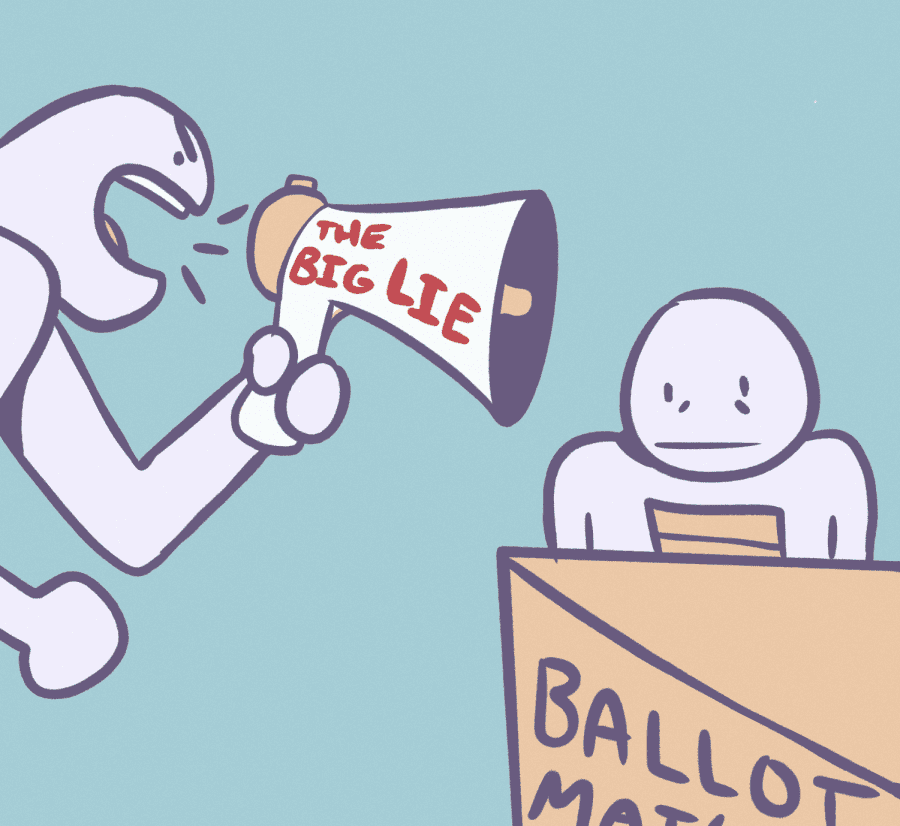Opinion | Election deniers pose dire threat to midterms
Sep 19, 2022
The post-election narrative peddled by former President Donald Trump that the 2020 presidential vote was “stolen” has been an appalling display of deceit and disinformation that poses a severe threat to American democracy — depending on who is asked, that is. To most, the aforementioned account appears accurate. To many, however, Trump has simply been exercising his right to contest the election.
A New York Times poll from July shows how the divide between these two opinions has grown increasingly along party lines, with Democratic voters overwhelmingly favoring the former and Republican voters the latter. This divide doesn’t only exist as a matter of opinion within the general public — it also exists as a matter of election strategy for the GOP.
If Jan. 6, 2021 was the tragic climax of “The Big Lie,” expect Nov. 8, 2022 to be a sort of epilogue that sets up the sequel picture.
This is not to say that November’s midterm elections will be a pure reflection of the state of election denialism in the United States. History dictates that midterms are a referendum on the president, as the party in power almost always loses seats — since 1934, an average of 28 in the House and four in the Senate. There’s also high inflation and President Biden’s low approval ratings to consider, which typically portend poor midterm election results as well.
While one would be naïve to believe that election denialism is the American public’s biggest concern heading into the midterms, they would be equally foolish to dismiss the severity of the danger it poses.
Get The Daily Illini in your inbox!
To understand the threat, one must look to its catalyzing moment. On Jan. 6, 147 members of Congress voted to overturn the 2020 election results even after the attack on the Capitol. All of them were Republicans. This vote also occurred after Trump’s team exhausted every avenue of legal recourse to alter the election’s outcome and failed on all accounts.
Such a large sect of the GOP peddling “The Big Lie” in the aftermath of Jan. 6 encouraged even more congresspeople to join the narrative — and now state officials and nominees have too. A daunting new Bloomberg study has identified 254 current Republican elected officials and nominees who have either denied or cast doubt upon the legitimacy of the 2020 election.
The group is composed of 185 current governors, secretaries of state, attorneys general or U.S. Senate and House members. The other 69 are nominees for these various positions.
If all the federal nominees are elected to Congress, Mr. Trump would have 42 more mouthpieces parading his disinformation campaign in the nation’s capital. They would also be likely to support any restrictive federal election legislation that may come to the floor when Republicans likely flip the House in November.
Even scarier still: If the 27 nominees running for the state positions of governor, attorney general and secretary of state are elected, those states’ election laws will be in the hands of people who deny the validity of an election that Mr. Trump’s former Attorney General has since testified under oath had zero evidence of widespread fraud.
In his post-election strategy, Mr. Trump was not only using his right to contest his defeat — he set in motion a cascade to alter the configuration of future elections.
Not only has election denialism sullied the Republican field of nominees, foreshadowing an uncertain future for the 2024 presidential election and others thereafter, but it also has mobilized some citizens to sow disarray within their communities ahead of this November’s election.
Local election officials have been quitting in droves due to threats and constant harassment from the voters they serve, and across the country have emerged dozens of organizations that train election denialists to knock on doors peddling election disinformation and pressing people on their voting records. “The Big Lie” has permeated not only the halls of Washington but also polling places — and even voters’ homes.
President Biden addressed the nation last week, saying “MAGA Republicans” are working “in state after state to give power to decide elections in America to partisans and cronies, empowering election deniers to undermine democracy itself.”
If one finds President Biden’s tone to be alarmist, they must ask themselves: Does having more people who deny the results of an unequivocally certified election hold public office strengthen or weaken America’s core democratic principles?
If they possess any sense, the answer should be clear.
Nick is a senior in LAS.






